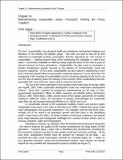Mainstreaming sustainable urban transport: putting the pieces together
Author(s)
Zegras, Christopher; Zegras, Pericles C
DownloadZegras_Chapter19 Mainstreaming Sustainable Urban Transport (002).pdf (373.9Kb)
OPEN_ACCESS_POLICY
Open Access Policy
Creative Commons Attribution-Noncommercial-Share Alike
Terms of use
Metadata
Show full item recordAbstract
The term ‘sustainability’ has ploughed itself into mainstream development dialogue and literature, if not entirely into popular jargon. One does not need to look far to find references to sustainable housing, consumption, forestry, agriculture etc. The concept of sustainability – meeting present needs while maintaining the capability to meet future needs – has proved invaluable in making society explicitly aware of the need to pass on natural resources to future generations. Sustainability has also come to encompass a
broader development agenda, focused on the balance of environmental, social and economic objectives. In this sense, sustainability has been useful in establishing a more level rhetorical playing field among possibly competing objectives. At the same time, the broadening of the meaning of sustainability and the increasing ubiquity of the term’s use runs the risk of watering down the meaning of the concept. When sustainability becomes associated with more and more, does it start to mean less and less?
Date issued
2011Department
Massachusetts Institute of Technology. Department of Urban Studies and PlanningJournal
Urban Transport in the Developing World: A Handbook of Policy and Practice
Publisher
Edward Elgar Publishing
Citation
Zegras, Christopher. “Mainstreaming Sustainable Urban Transport: Putting the Pieces Together.” Urban Transport in the Developing World, Edward Elgar Publishing, 2011.
Version: Author's final manuscript
ISBN
9781847202055